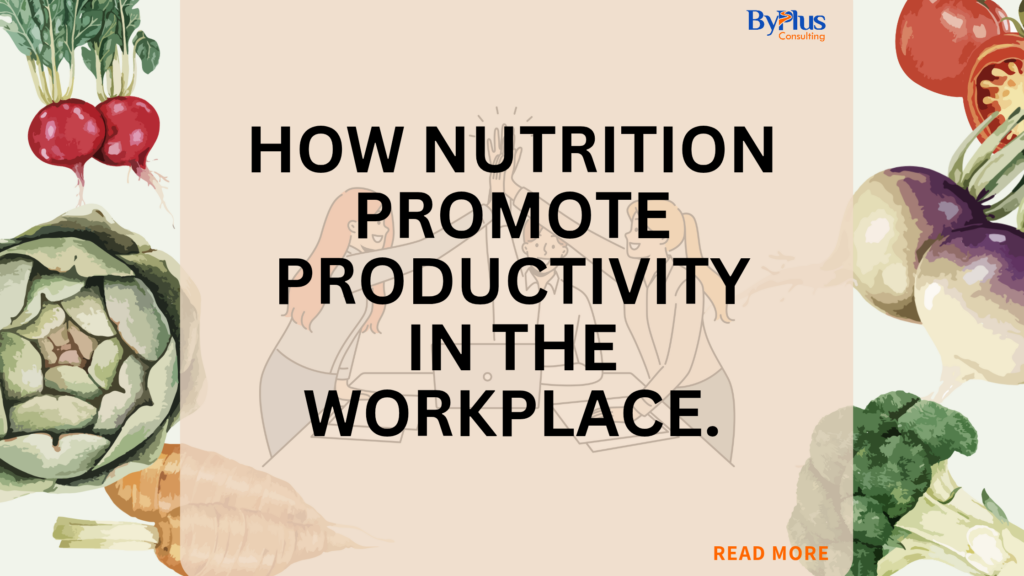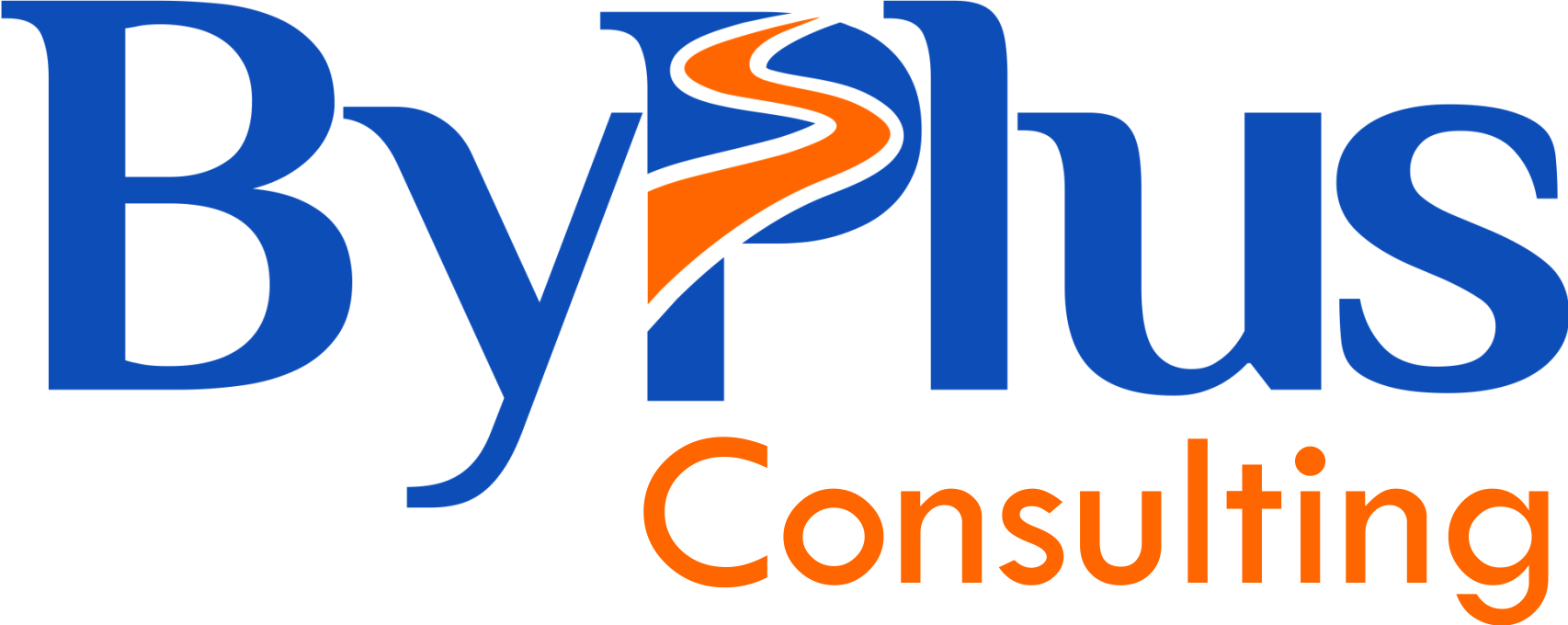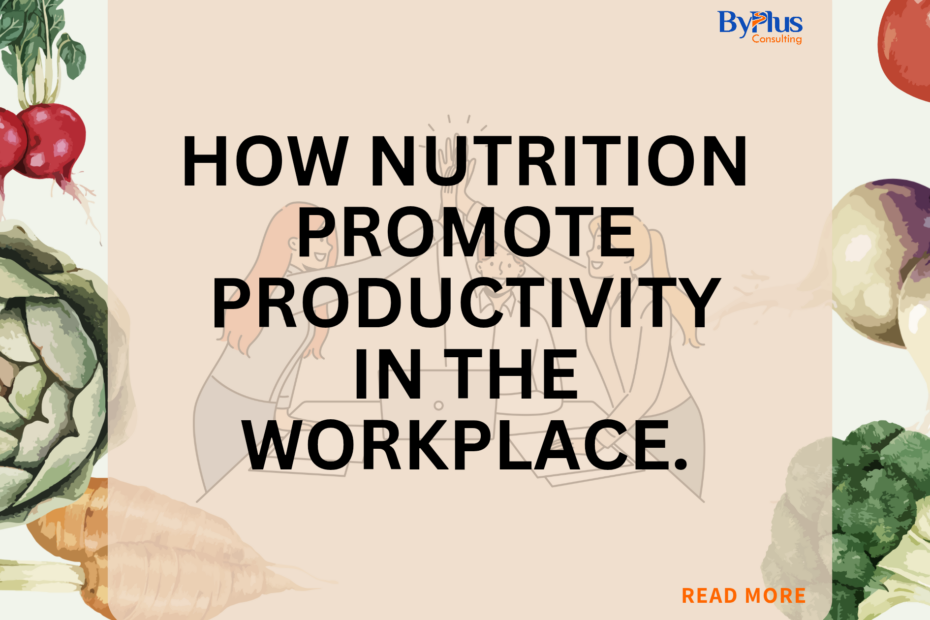In today’s fast-paced work environment, organizations are constantly searching for ways to enhance productivity, employee engagement, and overall workplace well-being. While factors like leadership, work culture, and technology play crucial roles, one often-overlooked element is “NUTRITION”. The food employees consume directly impacts their energy levels, cognitive function, and overall health, making workplace nutrition a critical factor in organizational success.

WHY IT MATTERS IN THE WORKPLACE.
Employees who fuel their bodies with nutrient-rich foods experience higher energy levels, improved concentration, and enhanced problem-solving skills. In contrast, poor dietary choices—such as excessive processed foods, sugar, and unhealthy fats—can lead to fatigue, brain fog, and increased absenteeism. By prioritizing workplace nutrition, organizations can create a healthier, more vibrant, and more productive workforce.
1. INCREASED ENERGY AND PRODUCTIVITY.
One of the most immediate benefits of proper nutrition is sustained energy levels. Foods rich in complex carbohydrates, lean proteins, and healthy fats provide steady energy throughout the day. In contrast, high-sugar or heavily processed meals cause energy crashes, leaving employees sluggish and less productive. For example, incorporating healthy snack stations with nuts, fruits, and protein bars can help employees maintain energy and focus without resorting to caffeine or sugary treats.
2. ENHANCED COGNITIVE FUNCTION AND FOCUS.
Brain health is closely linked to diet. Foods rich in omega-3 fatty acids, antioxidants, and vitamins—such as salmon, blueberries, and leafy greens—enhance cognitive function, memory, and concentration. Encouraging employees to make smarter food choices can lead to sharper decision-making, better problem-solving skills, and increased efficiency.
3. REDUCED STRESS AND IMPROVED MENTAL WELL-BEING
The workplace can be stressful, and poor nutrition can exacerbate stress levels. Diets high in processed foods and sugars can contribute to anxiety and mood swings, whereas nutrient-dense foods help regulate stress hormones and promote emotional stability.
Providing healthy meal options, wellness programs, and access to nutrition education can contribute to a more positive and balanced work environment. Employees who feel physically and mentally well are more likely to be engaged, motivated, and resilient.
4. LOWER ABSENTEEISM AND HEALTH CARE COST
Poor nutrition is a leading cause of chronic illnesses such as obesity, diabetes, and cardiovascular disease. Organizations that promote healthy eating habits can reduce employee sick days, lower healthcare costs, and enhance overall workplace morale.
COMPANIES CAN SUPPORT WORKPLACE NUTRITION BY:
✔ Offering nutritious cafeteria options
✔ Providing dietitian consultations
✔ Encouraging hydration with water stations
✔ Hosting healthy cooking workshops
5. STRENGTHENING WORKPLACE CULTURE AND COLLABORATION
A strong workplace culture thrives on engagement and collaboration, and nutrition can play a pivotal role in fostering connections. Organizing team lunches with healthy meal options, implementing “Wellness Wednesday” initiatives, or offering nutrition challenges can bring employees together while reinforcing a shared commitment to well-being.
HOW ORGANIZATIONS CAN IMPLEMENT BETTER NUTRITION STRATEGIES.
Enhancing workplace nutrition doesn’t have to be complicated. Here are a few actionable steps:
✅ Revamp Office Snacks & Meals – Replace vending machines stocked with chips and sodas with healthier alternatives like granola bars, trail mix, probiotics like yoghurts and fresh fruit.
✅ Promote Healthy Eating Habits – Provide employees with educational resources on the benefits of proper nutrition through workshops, newsletters, or guest speakers.
✅ Encourage Hydration – Install water stations throughout the office and encourage employees to drink sufficient water throughout the day.
✅ Flexible Lunch Breaks – Allow employees time to enjoy nutritious, unhurried meals, reducing the temptation for fast-food choices.
IN CONCLUSION: A Healthier Workforce is a More Productive Workforce.
Nutrition plays an essential role in shaping employee health, performance, and workplace culture. Organizations that prioritize healthier food choices and wellness programs reap the rewards of increased productivity, reduced absenteeism, and a happier workforce.
By taking simple yet effective steps to improve nutrition in the workplace, businesses can foster an environment where employees feel energized, engaged, and empowered to perform at their best.
READY TO TRANSFORM YOUR WORKPLACE WITH NUTRITION?
Start small— swap out unhealthy snacks, educate employees on better eating habits, and lead by example. A well-nourished team is a high-performing team, and investing in workplace nutrition is a step toward long-term organizational success.
For exclusive career-changing tips and FREE TEMPLATES, join our Telegram Channel by clicking the link attached – https://t.me/bypluscareerconnecthub
Crisis happens almost everyday in the workplace, as the Boss, Manager, or HR, how do you manage crisis in the workplace, Read the strategies of managing crisis here – https://www.byplusconsulting.com/blog/how-to-manage-crisis-in-the-workplace/
Do not forget to follow us on our social media space and subscribe to our YouTube Channel via the link below – https://youtube.com/@byplusconsulting
So, as a CEO, a manager and Human Resources Manager, which of these strategies will fit into your workplace.

